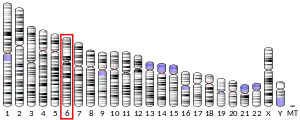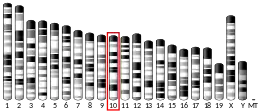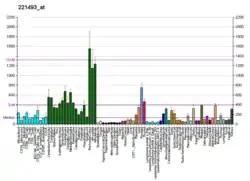| TSPYL1 | |||||||||||||||||||||||||||||||||||||||||||||||||||
|---|---|---|---|---|---|---|---|---|---|---|---|---|---|---|---|---|---|---|---|---|---|---|---|---|---|---|---|---|---|---|---|---|---|---|---|---|---|---|---|---|---|---|---|---|---|---|---|---|---|---|---|
| Identifiers | |||||||||||||||||||||||||||||||||||||||||||||||||||
| Aliases | TSPYL1, TSPYL, TSPY-like 1, TSPY like 1 | ||||||||||||||||||||||||||||||||||||||||||||||||||
| External IDs | OMIM: 604714 MGI: 1298395 HomoloGene: 22522 GeneCards: TSPYL1 | ||||||||||||||||||||||||||||||||||||||||||||||||||
| |||||||||||||||||||||||||||||||||||||||||||||||||||
| |||||||||||||||||||||||||||||||||||||||||||||||||||
| |||||||||||||||||||||||||||||||||||||||||||||||||||
| |||||||||||||||||||||||||||||||||||||||||||||||||||
| |||||||||||||||||||||||||||||||||||||||||||||||||||
| Wikidata | |||||||||||||||||||||||||||||||||||||||||||||||||||
| |||||||||||||||||||||||||||||||||||||||||||||||||||
Testis-specific Y-encoded-like protein 1 is a protein that in humans is encoded by the TSPYL1 gene.[5][6]
References
- 1 2 3 GRCh38: Ensembl release 89: ENSG00000189241 - Ensembl, May 2017
- 1 2 3 GRCm38: Ensembl release 89: ENSMUSG00000047514 - Ensembl, May 2017
- ↑ "Human PubMed Reference:". National Center for Biotechnology Information, U.S. National Library of Medicine.
- ↑ "Mouse PubMed Reference:". National Center for Biotechnology Information, U.S. National Library of Medicine.
- ↑ Vogel T, Dittrich O, Mehraein Y, Dechend F, Schnieders F, Schmidtke J (Oct 1998). "Murine and human TSPYL genes: novel members of the TSPY-SET-NAP1L1 family". Cytogenet Cell Genet. 81 (3–4): 265–70. doi:10.1159/000015042. PMID 9730615. S2CID 46829106.
- ↑ "Entrez Gene: TSPYL1 TSPY-like 1".
Further reading
- Wiemann S, Weil B, Wellenreuther R, et al. (2001). "Toward a catalog of human genes and proteins: sequencing and analysis of 500 novel complete protein coding human cDNAs". Genome Res. 11 (3): 422–35. doi:10.1101/gr.GR1547R. PMC 311072. PMID 11230166.
- Simpson JC, Wellenreuther R, Poustka A, et al. (2001). "Systematic subcellular localization of novel proteins identified by large-scale cDNA sequencing". EMBO Rep. 1 (3): 287–92. doi:10.1093/embo-reports/kvd058. PMC 1083732. PMID 11256614.
- Scherl A, Couté Y, Déon C, et al. (2003). "Functional proteomic analysis of human nucleolus". Mol. Biol. Cell. 13 (11): 4100–9. doi:10.1091/mbc.E02-05-0271. PMC 133617. PMID 12429849.
- Strausberg RL, Feingold EA, Grouse LH, et al. (2003). "Generation and initial analysis of more than 15,000 full-length human and mouse cDNA sequences". Proc. Natl. Acad. Sci. U.S.A. 99 (26): 16899–903. Bibcode:2002PNAS...9916899M. doi:10.1073/pnas.242603899. PMC 139241. PMID 12477932.
- Ota T, Suzuki Y, Nishikawa T, et al. (2004). "Complete sequencing and characterization of 21,243 full-length human cDNAs". Nat. Genet. 36 (1): 40–5. doi:10.1038/ng1285. PMID 14702039.
- Puffenberger EG, Hu-Lince D, Parod JM, et al. (2004). "Mapping of sudden infant death with dysgenesis of the testes syndrome (SIDDT) by a SNP genome scan and identification of TSPYL loss of function". Proc. Natl. Acad. Sci. U.S.A. 101 (32): 11689–94. Bibcode:2004PNAS..10111689P. doi:10.1073/pnas.0401194101. PMC 511011. PMID 15273283.
- Gerhard DS, Wagner L, Feingold EA, et al. (2004). "The status, quality, and expansion of the NIH full-length cDNA project: the Mammalian Gene Collection (MGC)". Genome Res. 14 (10B): 2121–7. doi:10.1101/gr.2596504. PMC 528928. PMID 15489334.
- de Andrade TG, Peterson KR, Cunha AF, et al. (2006). "Identification of novel candidate genes for globin regulation in erythroid cells containing large deletions of the human beta-globin gene cluster". Blood Cells Mol. Dis. 37 (2): 82–90. doi:10.1016/j.bcmd.2006.07.003. PMID 16952470.
This article is issued from Wikipedia. The text is licensed under Creative Commons - Attribution - Sharealike. Additional terms may apply for the media files.




